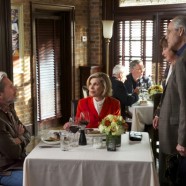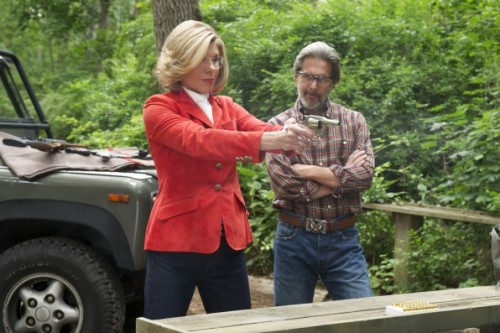The Good Wife, Episode Four: In Which I Am Annoyed
I’ve been a bit irritable this week, and I’ve decided to exorcise my crankiness by focusing not on this episode’s finer moments, but the two things that ticked me off most about it.
Diane Decides to Introduce her Liberal Friends to Kurt. It Goes Poorly.
Late in this episode, Diane and Kurt tie the knot. So it makes sense for the writers to underscore the risks of that decision by reminding viewers that these two don’t share the same political values and have never integrated the fabric of their lives—friends, family, daily routines. However, the scenes involving Lyle and Francesca came off as a ham-fisted attempt to level the ethical playing field between Diane and Kurt, as though the writers were shouting: “OH MY GOD YOU GUYS DID YOU KNOW THAT LIBERALS COULD BE JACKASSES TOO?!?” (Yes, yes I did). Lyle and Francesca prove unable to engage with anything or anyone that challenges their own insulated worldview (Lyle watches Fox News–but only the clips shown on the Daily Show).
Lyle and Fracesca are so abrasive that you wonder how Diane has managed to stay friends with them for decades. (Hey, I’m all for calling out NRA supporters on the consequences of lax gun control—but not two minutes after you’ve met them.)
The Case of the Week
A disgruntled paralegal (Chrissy) sues Lockhart Gardner for sexual harassment. I have no idea what point this storyline served, other than providing an excuse for Diane to return to Lockhart Gardner’s offices. The stakes were never there, because the writers failed to create the illusion of an uncertain outcome—the paralegal’s accusations were not only false, but easily explained away. This being network TV land, Lockhart Gardner wins an improbably large percentage of its cases, but the writers are typically capable of building suspense within each individual one. Logically, the viewer knows the firm will almost surely win—but it still feels like they’re on the brink of defeat. That didn’t happen this episode.
There is also something inherently problematic about the fictionalized depiction of false sexual harassment charges. In real life, of course, frivolous sexual harassment lawsuits do happen; they’re just far rarer than actual workplace sexual harassment, the vast majority of which goes unreported. (See this article).
But no work of drama (televised or otherwise) simply holds a mirror up to social reality; it chooses which parts of that reality to depict or exclude, and it always does so in dialogue with the cultural narratives that help shape that reality. When taking on controversial subject matter, responsible artists should be asking themselves what cultural narratives they are supporting or critiquing, and what their depiction brings to the cultural dialogue. It’s not clear that the writers did so in this case.
The episode opens with a scene shot from Chrissy’s perspective, scurrying through Lockhart Gardner’s hallways as a string of partners ask her to perform a series of menial tasks, with barely a thanks in return; the writers imply that Chrissy sues because she feels overworked and underappreciated. While Chrissy’s feelings appear justified, her response is so disproportionate that she comes across as unhinged. Her first interaction with Alicia, pre-lawsuit, underscores this impression. Glassy eyed and wearing a fixed smile, Chrissy declares that she’s “decided what I’m going to do;” the (false, as it turns out) implication is that she’s suicidal. The Good Wife has done several thoughtful episodes addressing verbal and physical violence against women (“VIP Treatment,” “The Art of War,” “Rape: A Modern Perspective”) but this episode reinforces the myth that sexual harassment charges emanate from the fevered brains of hysterical females.
One a More Positive Note…
The final scene achieves all the suspense that the rest of the episode lacks. Diane, having, discovered Alicia and the fourth years’ betrayal, goes to the Lockhart Gardner offices to warn Will. The writers and director sustain the moment’s tension through slowness and silence. As Diane paces deliberately down the hallway to her former office, she says nothing, not even while encountering Alicia (although she does give her a murderous glare). Then Diane turns and, still maintaining the same steady stride, walks up to Will’s desk and, finally, drops the bomb. The scene has the feel of a roller coaster creeping toward its crest.







